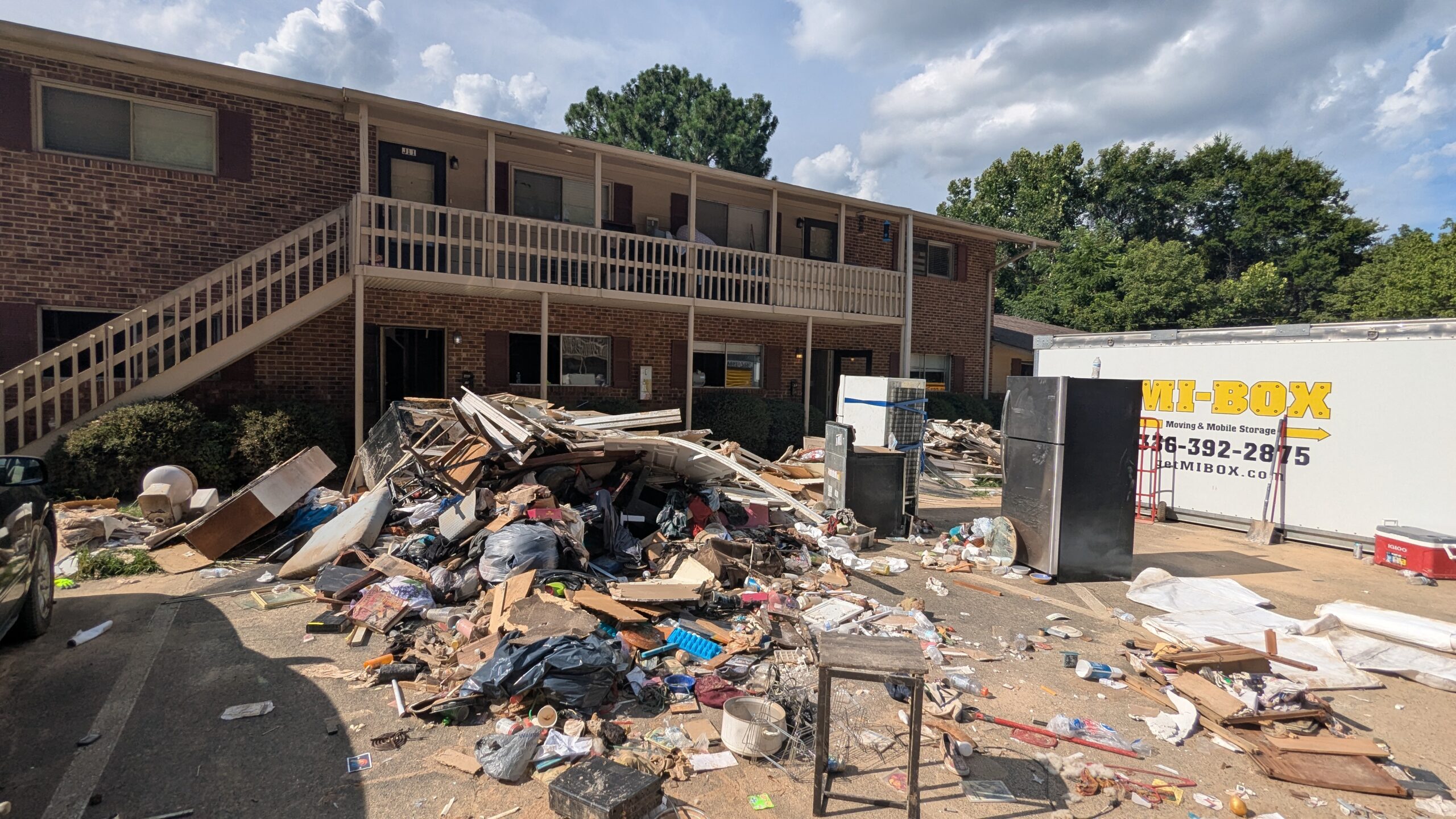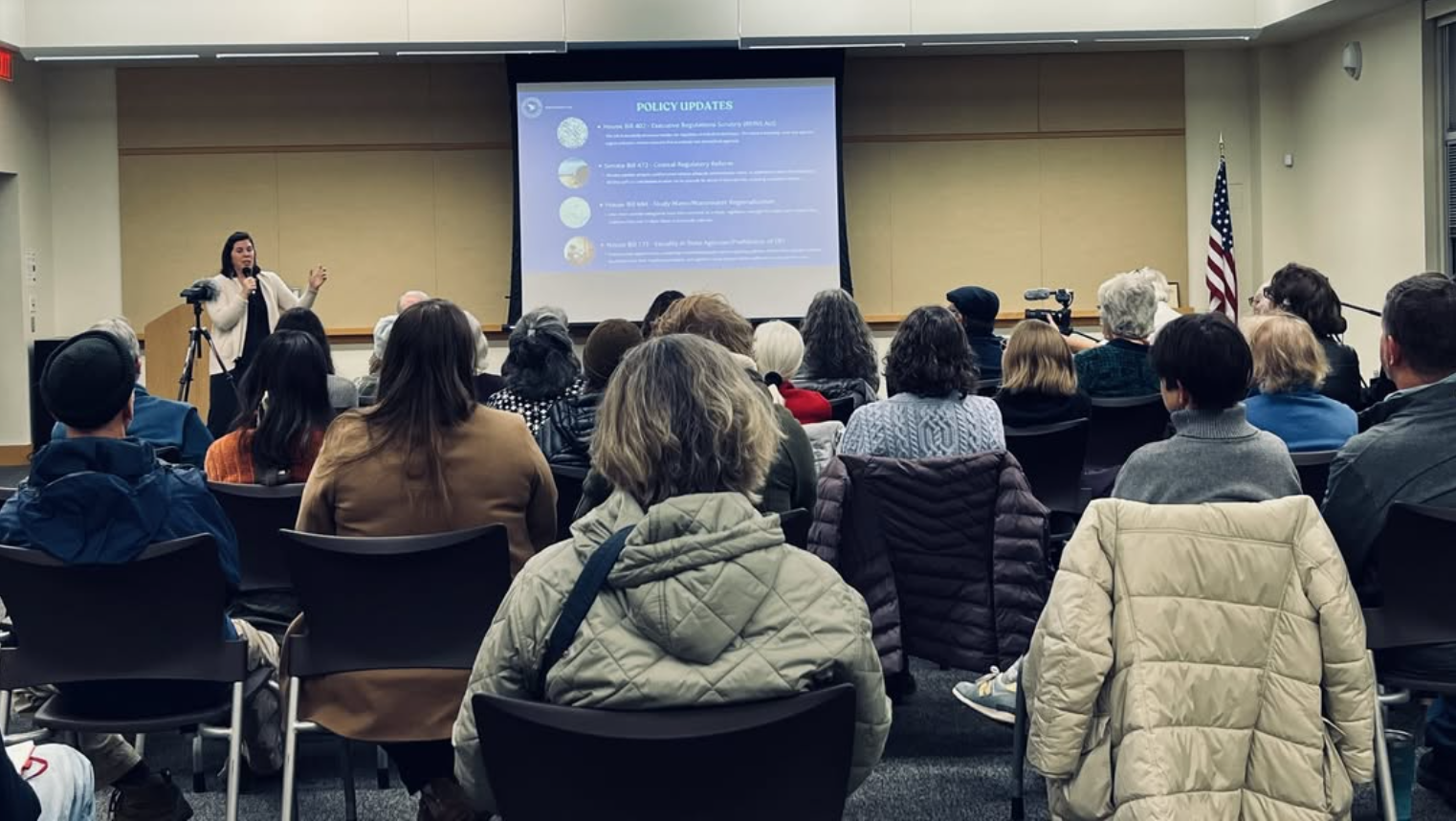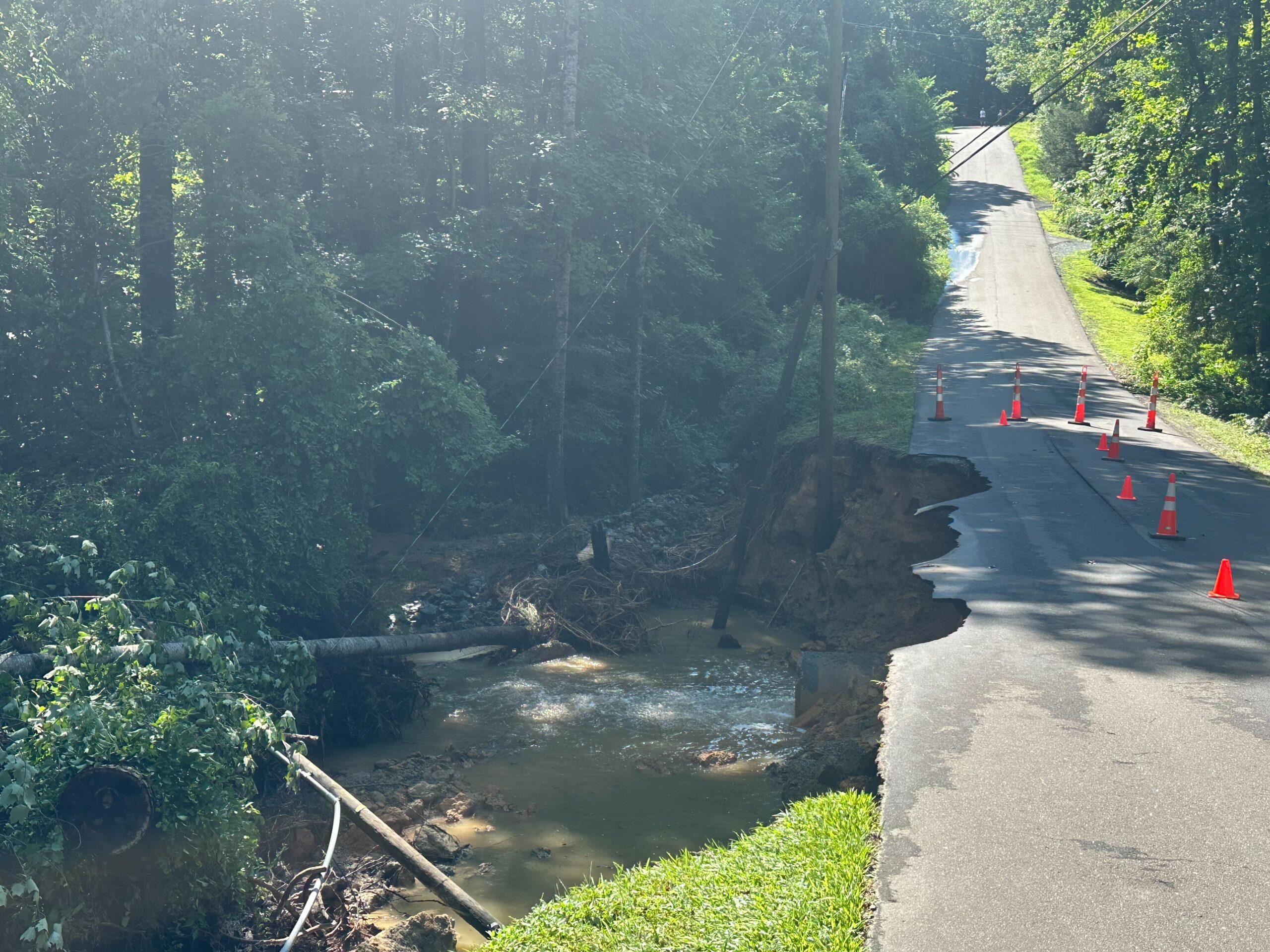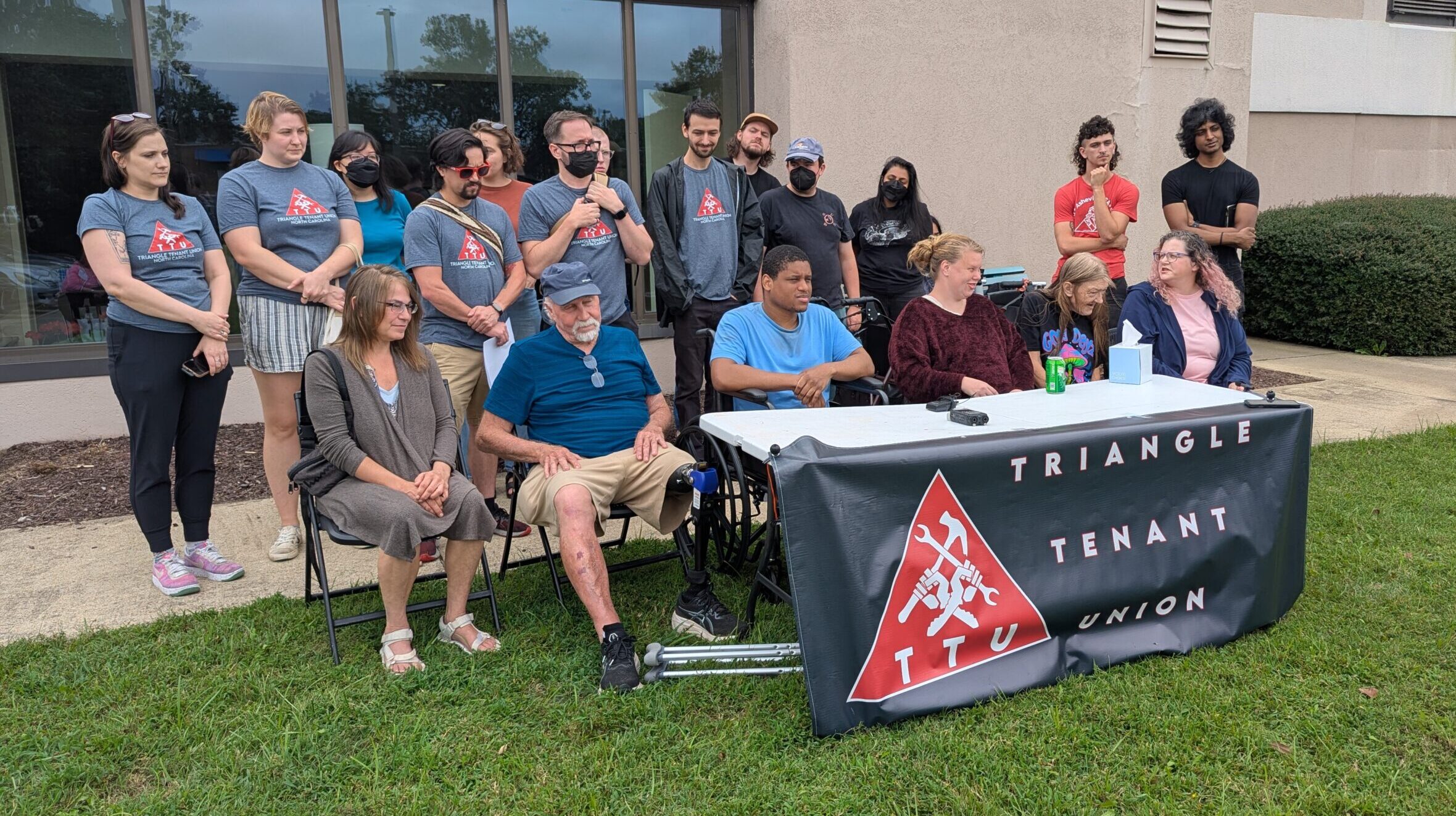North Carolina Gov. Josh Stein would come to the Eastgate Crossing while growing up in Chapel Hill. As he walked around the shopping center on Friday, he pointed out which business spaces used to be which businesses.
“This used to be Sal’s Pizza,” Stein said to gathered media, gesturing at the Kipos Green Tavern building. “And over there was Mariakakis Pizza.”
But for this visit, dumpsters and restoration trucks lined the parking lots, contractors ripped out the insides of shops and the smell of waterlogged building materials lingered. Stein toured some of the businesses between East Franklin Street and Fordham Boulevard to see the extent of damage left by Tropical Depression Chantal’s historic rain and flooding on the night of July 6.
“I knew this place exceptionally well,” the governor said, “and it hurts my heart for these business owners who invested their blood, their sweat, their tears, their capital into building successful small businesses just to have it washed away in a single day. That’s what’s crazy: a few hours of rain can completely turn lives upside down.”
The preliminary property damage estimates in Chapel Hill from the floods are around $27 million, with $17 million of that coming from Eastgate, Mariakakis Plaza and the nearby University Place. On Friday, Stein and several Orange County dignitaries examined the restoration efforts at Kipos, as well as Olmaz Jewelers on the other side of the shopping center.

(From left to right) Great Outdoors Provision Co. Manager Chad Pickens speaks with Chuck Millsaps, Gov. Josh Stein and Elie Abou-Rjeileh of Olmaz Jewelers in Olmaz’s damaged space as part of Stein’s Eastgate Crossing tour. (Photo by Brighton McConnell/Chapel Hill Media Group.)
Co-owner of Olmaz Elie Abou-Rjeileh told Chapelboro despite his businesses being gutted and missing several feet of drywall all the way around, it was an “incredible honor” to welcome Stein inside. He said he is confident that both the local governments and state government will help provide resources to work toward reopening.
“The governor’s declaration of disaster marks an important first step in the long process of unlocking support,” said Abou-Rjeileh, “not just for us, but for all the tenants in Eastgate who were impacted. His decision to come to Chapel Hill and witness the damage firsthand brought a real sense of validation, pride, and renewed hope for the future.”
Stein issued the declaration Wednesday night — citing the need for preliminary damage assessments to be completed as the reason for a delay between the storm and his measure. He credited Orange County’s first responders, emergency management staff and elected officials for their initial work and after completing a more in-depth survey, the extent of state and federal disaster relief available will become clearer.
North Carolina Director of Emergency Management Will Ray echoed those same sentiments, crediting the local response so far — even if it may feel slow-moving to flood victims.
“You have a lot of momentum here, particularly in Orange County, on how…this community can be supported and how we get them back on their feet,” Ray told gathered reporters. “I think our commitment, working the governor and team, is to pull all the levers we have available via statute or federal policy. Right now, [Stein’s] direction to us was ‘be as creative as possible’ on how we do some of this [recovery.]”

Gov. Josh Stein takes a question during a media availability at Kipos following his tour of Eastgate Crossing. (Photo by Brighton McConnell/Chapel Hill Media Group.)
After touring Eastgate Crossing, Stein and others visited Camelot Village on South Estes Drive — a lower-income neighborhood notorious for being in the floodplain of Bolin Creek. It was the site of several water rescues on the night of July 6, in part because of a fallen tree blocked the exit while the floods rushed in. The scene on Friday included community members wearing protective masks and thick boots as they navigated debris still outside of units.
The North Carolina governor spoke with gathered residents, hearing their individual experiences from the floods and looking into one man’s unit through a broken window to see the damage. He also spoke with Barbara Duffy, the president of Onyx Management, which manages Camelot Village and is based out of Chapel Hill. Duffy said Chantal created the fourth flood — and highest water levels — since Onyx began managing the property in 2021, raising questions around its future.
“What we need when a storm like this hits is help to get them out and safe, so we can come in and rebuild,” she told Stein. “And we would really like, on a national level, to see if this area could be redeveloped and if we could raise them up, and much like University Place, we could lower that [floodplain] footprint and keep some rent-controlled places.”
“It really is one of the last bastions of affordable housing in this area,” Duffy added later. “How do we preserve that where they have access to buses and where they can walk to the post office, bus stop, groceries stories, and still be able to live somewhere [after it floods]?”

Gov. Josh Stein listens to a group of Camelot Village residents recount their experience of Chantal’s flooding and the evacuations of the property two weeks ago.(Photo by Brighton McConnell/Chapel Hill Media Group.)

As residents and renters assess the damage to units, both debris and rescued belongings sat outside many of the community’s units on Friday, July 18. (Photo by Brighton McConnell/Chapel Hill Media Group.)
A key hurdle, Duffy said, is Camelot Village’s units being owned by a variety of people. Like how the Town of Chapel Hill was turned down from buying the land in 2005 with a FEMA grant in an effort to clear the floodplain, she said some second-story unit owners who do not want to sell because they are safer from flooding than other residents.
While walking around the Chapel Hill housing community, Stein was asked about the challenges and needs around severe weather like Chantal compared to the widespread destruction — and attention — brought by Hurricane Helene in 2024, which was quickly declared a disaster by FEMA.
“Whether you have a storm like Helene,” the governor responded, “or whether you have a storm like Chantal that may hit ten counties in a fairly localized way, if it’s your home, it doesn’t matter if you’re one of ten or one of a million. Your life has been turned completely upside down. And what we have to do is everything in our power to help folks get back on their feet — whether it’s the homeowners in this complex, the property owners, the small business owners at Eastgate…or helping the towns of Carrboro and Chapel Hill, which lost millions of dollars worth of equipment and property.
“So,” Stein concluded, “there’s a lot of work to be done. We’re going to do everything we can to help these folks recover.”
As flood victims await state and federal relief, the local governments of Orange County, Chapel Hill, Carrboro and Hillsborough created a donation fund to raise money for a variety of needs in Chantal’s aftermath. Additionally, several grassroots organizations began raising money or holding supply drives for affected residents. To see a list of donation options, click here.
Editor’s Note: Olmaz Jewelers is an advertiser with the Chapel Hill Media Group. The business’ inclusion in the story was not paid for.
Featured photo by Brighton McConnell/Chapel Hill Media Group.
Chapelboro.com does not charge subscription fees, and you can directly support our efforts in local journalism here. Want more of what you see on Chapelboro? Let us bring free local news and community information to you by signing up for our newsletter.











